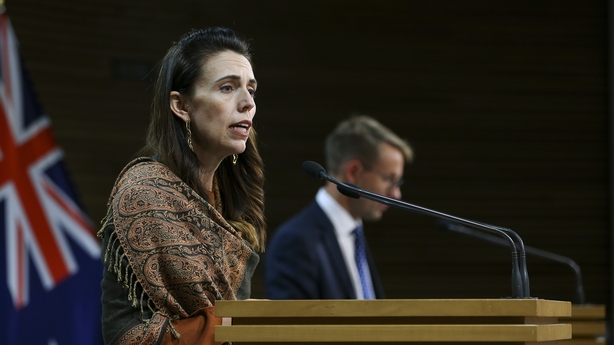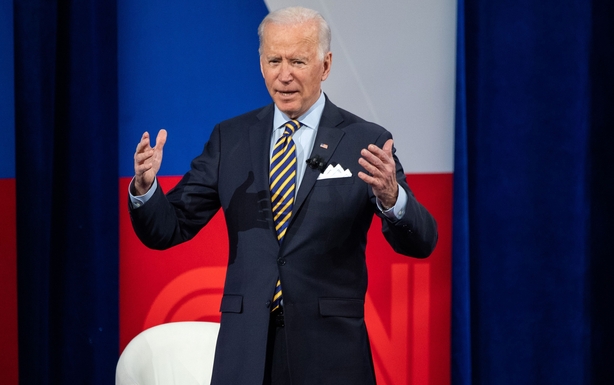Major cities in Australia and New Zealand lifted stay-at-home orders for millions of residents after successfully using snap lockdowns to quash outbreaks of virulent strains of Covid-19.
Authorities said swift action in Melbourne and Auckland helped contain flare-ups of the highly contagious UK coronavirus variant, contrasting with the less rigorous approach taken in Europe and other infection hotspots.
Announcing the end of a five-day shutdown in Melbourne, Victoria Premier Daniel Andrews hailed the tactic as a "short, sharp circuit-breaker".
"If we had been open throughout this outbreak ... total case numbers would be much, much higher and it is a certainty that I would not be reporting zero cases today," he said.
Mr Andrews' decision allows around six million residents to leave their homes, businesses to reopen and some spectators to return for the final days of the Australian Open tennis tournament.
In New Zealand, almost two million Aucklanders will enjoy similar freedoms after Prime Minister Jacinda Ardern said a three-day lockdown had quelled the city's most serious outbreak in almost six months.
She said: "We wanted to make sure we took a cautious approach because that's much, much better than getting it wrong and having a large-scale outbreak and a long lockdown."
Auckland is also hosting a major sporting event - the America's Cup yachting regatta - which is expected to resume this week with crowds watching from the shoreline restricted to 100.
Both the Auckland and Melbourne outbreaks involved the more transmissible virus strain first detected in Britain.
Mr Andrews has conceded such "hyper-infectious" variants are difficult to contain and examined tightening quarantine restrictions in Australia's second most populous state.
While Australia has largely contained the virus, Victoria state's Melbourne remains the country's worst affected city, enduring more than 100 days of lockdown late last year to curb an outbreak that killed about 800.
Mr Andrews said aggressive lockdowns may be needed again to keep the virus at bay.
"I can't stand here and be honest with people and say this will never, ever happen again," he said.

Ms Ardern said New Zealand's Covid-19 response - which involves rigorous contact tracing and widespread testing when there is a community case - had again proved effective.
The New Zealand leader has been widely praised for her handling of the pandemic, with just 26 deaths in a population of five million.
But Ms Ardern also signalled a willingness to use more lightning lockdowns if required, saying there was no room for complacency against the "tricky" threat posed by the virus.
"There is an indescribable anxiety that comes with the daily grind of managing a pandemic and I think we all feel it," she said.
Biden says vaccines available for all Americans by end July
Meanwhile, US President Joe Biden said that all Americans will have access to Covid-19 vaccines before August.

Mr Biden has previously predicted that vaccines might be available to all by spring, but the White House has recently toned down its optimism, citing difficulties both with availability of vaccines and ability to deliver them.
Asked when all Americans would be vaccinated, Mr Biden told a CNN town hall meeting with members of the public: "By the end of July this year."
"By the end of July we'll have 600 million doses, enough to vaccinate every American," he said.
Mr Biden also said that he wanted a faster return of children to schools and that he backs vaccinations for teachers. Authorities should "move them up in the hierarchy".
Asked at the town hall session when life would get back to normal, Mr Biden said "by next Christmas we'll be in a very different circumstance.
"A year from now I think that there'll be significantly fewer people that have to be socially distanced, have to wear a mask," Mr Biden said, adding that he could not be sure.
Sweden readying to close gyms, restaurants, hair salons
Sweden, known for its softer approach to the pandemic, is preparing to use new legislation to close gyms, restaurants and hair salons ahead of a feared third wave of virus infections, the government said today.
Sweden in January adopted a pandemic law giving the government new powers to curb the spread of the virus.
The country has never imposed the type of lockdown seen elsewhere in Europe, controversially relying on mostly non-coercive measures.
It has however gradually tightened measures since November, including a ban on alcohol sales after 8pm and on public gatherings of more than eight people.
Sweden has also introduced limits on the number of people allowed in sports centres, swimming pools and shopping centres and a recommendation to wear face masks on public transport during rush hour.
The government has previously made preparations under the pandemic law to shut shopping malls if necessary, but is now expanding that to include all commercial and service centres, such as gyms, pools, sports centres, hair salons, cafes and restaurants.
"In the event that the infection rate deteriorates drastically, the government will need to close some businesses," the government said in a statement.
"We have no announcement regarding closures today, but we are preparing to use that part of the pandemic law as well," Health Minister Lena Hallengren told reporters.
"Currently we don't believe it's necessary but we are of course not going to wait until it's too late," she said.
The country of 10.3 million people has been hit much harder than its Nordic neighbours, and yesterday reported a total of 617,869 cases of Covid-19 and 12,487 related deaths.
Cases have been in decline since mid-December, but the fall has tapered off lately and health officials are concerned that a third wave could be just around the corner.
Zanzibar's vice president dies after suffering Covid
Zanzibar's first vice president Seif Sharif Hamad, who led the island's opposition for three decades, died today, the president said, after he had been hospitalised for over three weeks with coronavirus.
Tanzania and its semi-autonomous island Zanzibar have played down the threat of of the virus, which President John Magufuli has said has been fended off by prayer.
However Hamad's ACT-Wazalendo party announced in January that the 77-year-old had been hospitalised with the virus.
"Hamad died this morning at Muhimbili National Hospital in Dar es Salaam where he was hospitalised," Zanzibar president Ali Hassan Mwinyi said in a short speech broadcast by state-run ZBC television.
"The nation has really lost a patriotic leader. I also declare seven days of mourning and the national flag will fly half-mast during."
President Magufuli also expressed his condolences in a message on Twitter.
Neither leader mentioned the cause of death.

